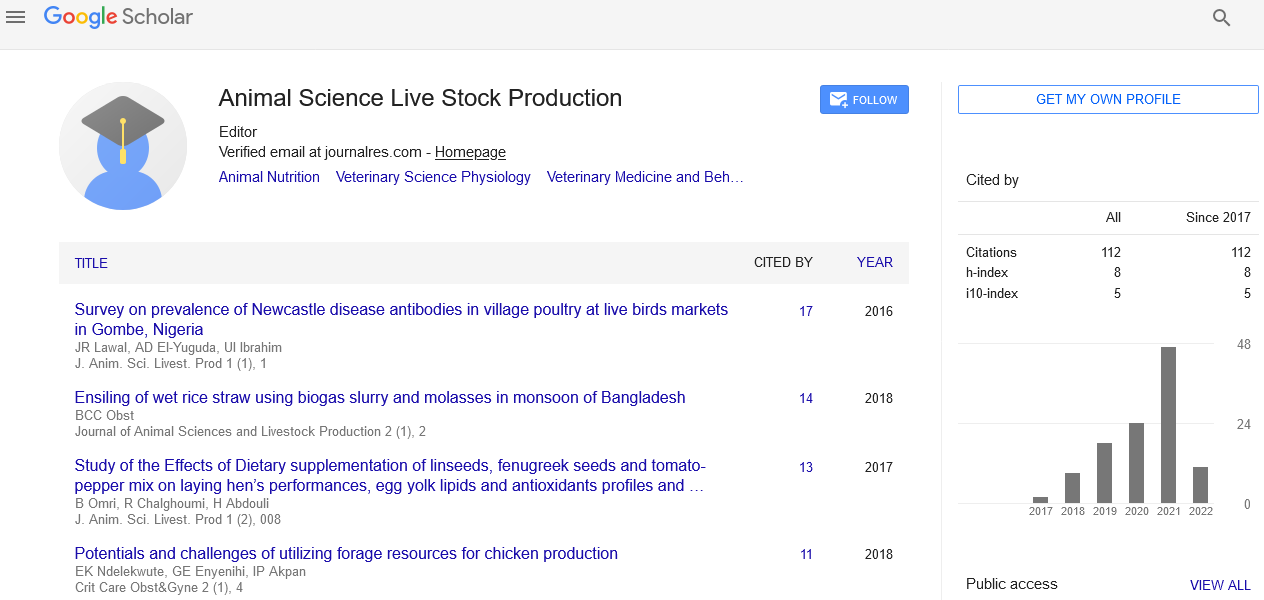Perspective - (2024) Volume 8, Issue 1
Preserving Earth's Treasures: The Importance of Wildlife Conservation
Tylor Thompson*
Department of Animal Sciences, Duke University, United States
*Correspondence:
Tylor Thompson,
Department of Animal Sciences, Duke University,
United States,
Email:
Received: 28-Feb-2024, Manuscript No. IPJASLP-24-19314;
Editor assigned: 01-Mar-2024, Pre QC No. IPJASLP-24-19314 (PQ);
Reviewed: 15-Mar-2024, QC No. IPJASLP-24-19314;
Revised: 20-Mar-2024, Manuscript No. IPJASLP-24-19314 (R);
Published:
27-Mar-2024, DOI: 10.36648/2577-0594.8.1.10
Introduction
In the vast tapestry of Earth’s ecosystems, wildlife animals play
an irreplaceable role. From the majestic elephants roaming
the savannahs to the tiny insects pollinating our plants, every
species contributes to the delicate balance of nature. However,
in recent times, this balance has been threatened by human
activities such as habitat destruction, poaching, and climate
change. As stewards of this planet, it is imperative that we
recognize the importance of wildlife conservation and take
action to protect these invaluable creatures. One of the primary
reasons for conserving wildlife is biodiversity. Biodiversity
refers to the variety of life forms present in an ecosystem,
including plants, animals, and microorganisms. A diverse
ecosystem is more resilient to environmental changes and
better able to withstand threats such as disease and invasive
species. Wildlife animals play a crucial role in maintaining this
biodiversity by contributing to ecosystem functions such as
pollination, seed dispersal, and nutrient cycling. For example,
bees and other pollinators are essential for the reproduction of
many flowering plants, including numerous crops that humans
rely on for food. Moreover, wildlife conservation is vital for
preserving ecosystem services that benefit humans. Ecosystem
services are the many ways in which ecosystems contribute to
human well-being, including clean air and water, fertile soil,
and climate regulation. For instance, forests act as carbon sinks,
absorbing carbon dioxide from the atmosphere and mitigating
climate change. Additionally, wetlands help filter and purify
water, making it suitable for drinking and irrigation.
Description
By protecting wildlife and their habitats, we ensure the
continuation of these essential services that sustain life on
Earth. Furthermore, wildlife conservation is crucial for cultural
and aesthetic reasons. Many indigenous cultures around the
world have deep spiritual and cultural connections to wildlife,
considering certain animals sacred or emblematic. For these
communities, the loss of wildlife species represents not only
an ecological crisis but also a cultural one. Additionally, wildlife
enriches our lives in profound ways, whether through the joy of
observing a majestic lion in the wild or the wonder of discovering
the intricate beauty of a butterfly’s wings. Preserving wildlife
ensures that future generations can continue to experience
these awe-inspiring moments. Despite the numerous benefits
of wildlife conservation, many species are currently facing
unprecedented threats to their survival. Habitat destruction,
primarily driven by deforestation, urbanization, and
agriculture, is one of the leading causes of wildlife decline.
As human populations continue to grow, the pressure on
natural habitats intensifies, leading to fragmentation and loss
of critical ecosystems. Moreover, illegal wildlife trade poses a
significant threat to many species, driving iconic animals such
as elephants, rhinos, and tigers to the brink of extinction.
Climate change exacerbates these threats by altering habitats
and disrupting ecosystems. Rising temperatures, shifting
precipitation patterns, and more frequent extreme weather
events pose challenges for wildlife adaptation and migration.
Species that are unable to cope with these changes may face
population declines or even extinction.
Conclusion
In conclusion, wildlife conservation is essential for maintaining
biodiversity, preserving ecosystem services, safeguarding
cultural heritage, and enriching our lives. As inhabitants of
this planet, it is our responsibility to protect and conserve
the diverse array of life forms with which we share Earth. By
promoting sustainable practices, supporting conservation
efforts, and advocating for policies that prioritize wildlife
protection, we can ensure a future where wildlife thrives
alongside humans, contributing to the health and well-being
of our planet.
Citation: Thompson T (2024) Preserving Earth's Treasures: The Importance of Wildlife Conservation. J Animal Sci. 8:10.
Copyright: © 2024 Thompson T. This is an open-access article distributed under the terms of the Creative Commons Attribution License, which permits unrestricted use, distribution, and reproduction in any medium, provided the original author and source are credited.

